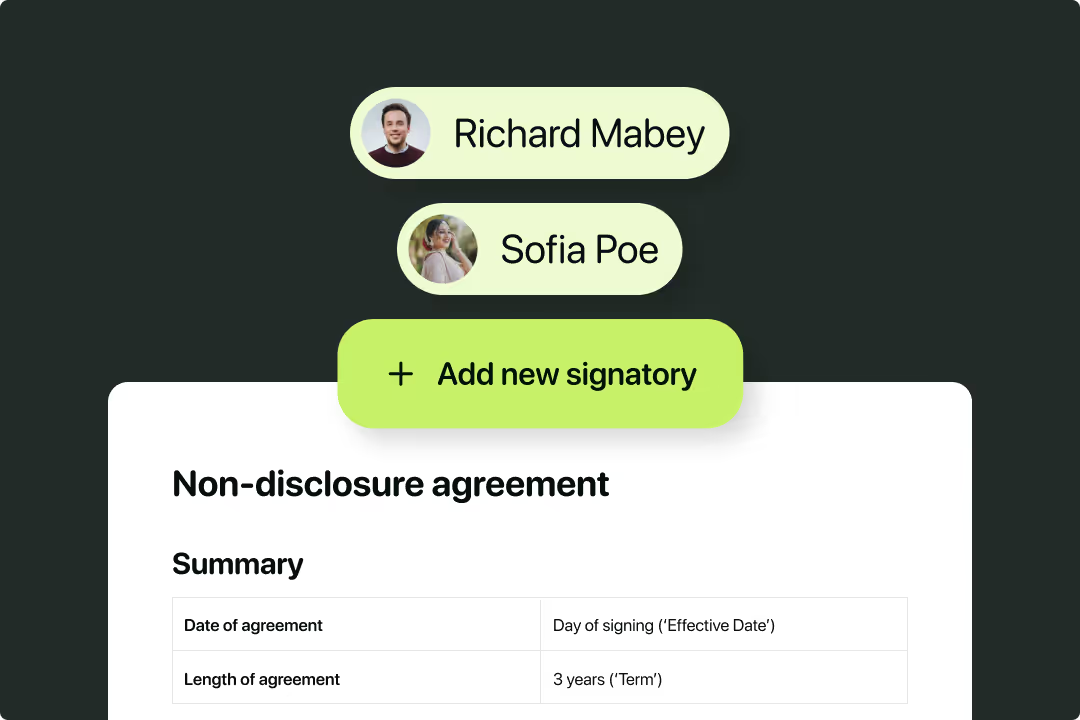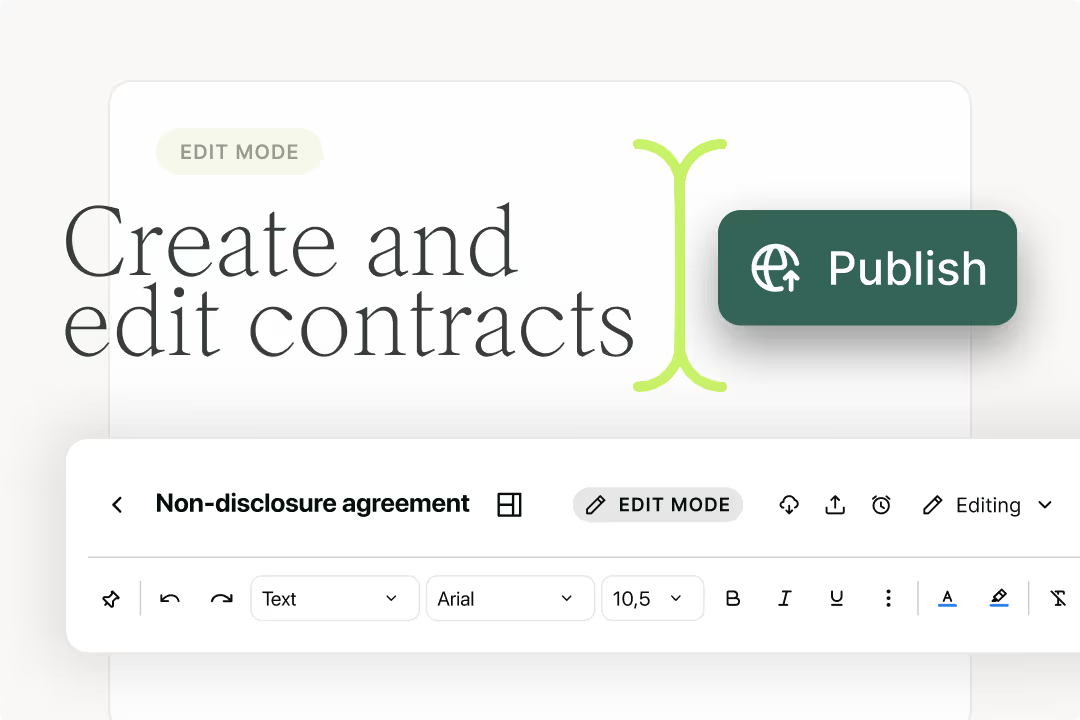Solutions
Customer Support
Resources
SugarCRM is a cloud-based customer relationship management (CRM) platform that sales teams use to track deals and acquire new customers. It can also be used to create and manage sales contracts - but only if it's set up properly.
Keep reading to find out how sales teams can use SugarCRM to streamline their contract workflow, and how to best set this up.
Sales teams can use SugarCRM to create contracts. How they do this will depend on the setup they have and the tools they use.
Interestingly, SugarCRM is one of the only popular CRMs to offer contract management functionality. Although it is basic, this enables sales teams to create contracts without leaving the platform. Let’s quickly run through what this workflow looks like in practice.
As we just mentioned, sales teams can use SugarCRM’s contract creation feature to generate contracts. However, this functionality is only available in certain versions of SugarCRM, and users will need to change their settings to access the ‘Contracts’ module.
Once they’ve set this up, they’ll need to upload their contract templates to the ‘Documents’ module in SugarCRM. They will also need to create a contract record which is where the data of the contract is stored.

When these steps are complete, users can select ‘Create contract’. This will open the contract record in SugarCRM where the sales rep will enter all of the relevant information, link the record to an account, and save the contract record.
The contract can then be shared via email using the link provided in SugarCRM. It can also be saved as a PDF if the sales reps wish to share it another way.
But it’s also worth mentioning that, because SugarCRM is highly customizable, setting up this workflow requires a lot of configuration. Teams will need to move between different modules and dedicate time to building out these workflows.
This is distinct from out-of-the-box contract management systems like Juro which are known for being user-friendly and easy to implement.
Aside from being difficult to set up and configure, there are also a few other limitations to consider before using SugarCRM as a standalone contract management tool. Let’s cover these now.
While sales teams can create contracts in SugarCRM, they can’t manage the rest of the contract workflow within the tool. Instead, they’re left with a fragmented system that relies on multiple different tools and manual data entry.
For example, SugarCRM doesn’t offer native eSignature functionality, meaning you’ll need to use a separate eSigning tool to sign the contracts you create.
SugarCRM also has limited reporting capabilities, meaning it doesn’t provide full visibility into contracts. If you want to record and report on contract data, you’ll need to manually input the data into a contract management spreadsheet of some sort. This means adding yet another platform to your contract workflow.
SugarCRM may support contract creation, but it isn’t designed for it. It can be used to create documents using templates but it lacks the more advanced contract automation features that are available in contracting tools like Juro.
Conditional logic is one example of this. When sales teams integrate SugarCRM with a platform like Juro, legal teams are able to set rules in contract templates. These rules can be set up to automatically, add, remove, or change clauses in a contract based on the data stored in the SugarCRM.
For example, a clause might be automatically added to the contract if the contract value meets a certain threshold, or if the prospect has agreed to provide a case study.
This removes the need to create lots of separate templates and leaves less scope for sales teams to draft their own contract terms. But it isn’t possible when you use SugarCRM alone.
If sales teams want access to features like these, they’ll need to integrate SugarCRM with a platform like Juro. Otherwise, sales teams will need to manually update and edit each contract template to make it fit for use.
Rather than relying on SugarCRM’s limited feature set, sales teams can integrate SugarCRM with a contract management system like Juro. This can be done quickly and easily using Zapier.
Once connected, sales teams can create contracts in SugarCRM and benefit from the advanced contract management features Juro has to offer, such as:

Let’s explore what this workflow might look like for sales teams in more detail now.
Integrating SugarCRM and Juro enables legal and sales teams to set up certain triggers. When one thing happens in SugarCRM, this will trigger something to happen in Juro, and vice versa.
One of the best ways to use these triggers is to set up a workflow for a contract to be created in Juro when a new opportunity is created in SugarCRM.
This will enable sales teams to generate contracts in seconds using contract templates that have been pre-approved by legal, and the data stored in SugarCRM.

The integration also allows teams to set up a trigger so that a task is created in SugarCRM when contracts reach a certain status in Juro.
For example, you could set up a trigger to create onboarding tasks once a contract has been signed. That way, you can keep all of your contract stakeholders in the loop about the status of contracts and their involvement.

To recap: it’s possible to use SugarCRM for contract management. But unless you integrate it with a more sophisticated contract management system like Juro, you’ll be limited in what you can do and how quickly you can do it.
However, if you connect the two tools, you’ll benefit from the following things.
The templates used to create contracts are more advanced in Juro than they are in SugarCRM. This means that legal teams can set rules within the templates using conditional logic, which isn’t possible if you use SugarCRM as a standalone tool.
As we mentioned earlier, dynamic workflows like this remove the need to create separate contract templates for certain circumstances. They also remove the need for sales teams to make their own edits to a contract template, and this minimizes contract risk.

Sales contracts created in Juro are built as structured data. This makes them fully searchable. Rather than trawling through hundreds of contracts scattered across shared drives, HR teams can simply use Juro’s OCR feature to search for specific words, parties, or values across their contracts.
Not only that, but Juro users can also build customizable contract dashboards for their contracts. This enables them to filter the contracts by the data captured in the template’s smartfields, such as party names, contract types and contract value.
This provides visibility into contracts and a single source of truth for sales agreements.

Juro users also have access to contract analytics, providing them with detailed insights into various contract metrics. This makes it quick and easy to track progress against certain contract management KPIs and understand your sales contracts are performing overall.
Unlike SugarCRM, Juro also offers native eSignature functionality and real-time contract redlining.
This means contracts can be negotiated and signed within the platform, rather than moving between email, Word files, and eSigning tools to get them over the line.
This is great because fewer tools mean less friction and faster sales cycles.
If you’re looking for a way to manage sales contracts in SugarCRM with less friction and fewer tools, Juro’s integration is a great option.
Fill in the form below to find out more about how Juro can improve the way you manage sales contracts in 2026.

Lorem ipsum dolor sit amet, consectetur adipiscing elit. Suspendisse varius enim in eros elementum tristique. Duis cursus, mi quis viverra ornare, eros dolor interdum nulla, ut commodo diam libero vitae erat. Aenean faucibus nibh et justo cursus id rutrum lorem imperdiet. Nunc ut sem vitae risus tristique posuere.

